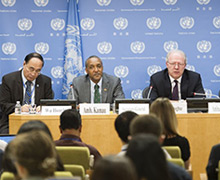news
GFDD/Funglode Attends the Final Weeks of Negotiations and Historic Adoption of the Draft Post-2015 Development Agenda
August 5, 2015
The final version of the draft Post-2015 Development Agenda (the Agenda), entitled ‘Transforming our World: The 2030 Agenda for Sustainable Development,’ was adopted by acclamation at the conclusion of an informal plenary of intergovernmental negotiations on Sunday August 2. GFDD/Funglode was present for the concluding session
of a negotiating process that has spanned more than two years, as countries agreed to an ambitious agenda that features 17 new sustainable development goals that aim to end poverty, promote prosperity and people’s well-being while protecting the environment by 2030. The text will be recommended for adoption at the 69th UN General Assembly,
during the UN Summit on the Post-2015 Development Agenda, at UN Headquarters in New York on September 25-27 September 2015.
The final negotiation session for the Agenda was a marathon event that spanned two weeks from Monday July 20 to Sunday August 2. The final session took place on Sunday August 2 in the evening, following the suspension of the plenary at 4:45 am on Saturday, 1 August. UN Member States held informal discussions on the climate paragraph and other outstanding issues in the draft text. Last-minute changes to the text, based on informal discussions between delegations, related to
migrants’ human rights, debt sustainability, resources for Land-locked Developing Countries (LLDCs), Least Developed Countries, Small Island Developing States and other categories of countries, and other issues. Upon considering the final version of the document, South Africa spoke on behalf of the Group of 77 and China (G-77/China) to welcome the recognition that eradicating poverty in all its forms is the greatest challenge and indispensable for sustainable development,
and announced the Group’s readiness to adopt the document.
Some of the key targets agreed in the final text are included below:
- Poverty eradication: By 2030 eradicate extreme poverty for all people everywhere, currently measured as people living on less than $1.25 a day (target 1.1);
- Elimination of hunger: By 2030 end hunger and ensure access by all
people, in particular the poor and people in vulnerable situations including infants, to safe, nutritious and sufficient food all year round (target 2.1); - Promoting healthy lives: By 2030 end the epidemics of AIDS, tuberculosis, malaria, and neglected tropical diseases and combat hepatitis, water-borne diseases, and other communicable diseases (target 3.3);
- Gender equality: End all forms of discrimination
against all women and girls everywhere (target 5.1); - Access to water: By 2030, achieve universal and equitable access to safe and affordable drinking water for all (target 6.1);
- Access to energy: By 2030 ensure universal access to affordable, reliable, and modern energy services (target 7.1);
- Sustainable cities: By 2030, reduce the adverse per capita environmental
impact of cities, including by paying special attention to air quality, municipal and other waste management (target 11.6); - Sustainable consumption and production: By 2030, substantially reduce waste generation through prevention, reduction, recycling, and reuse (target 12.5);
- Climate change: Improve education, awareness raising and human and institutional capacity on climate change mitigation, adaptation, impact reduction, and early warning (target 13.3);
- Ocean conservation: By 2020, conserve at least 10 per cent of coastal and marine areas, consistent with national and international law and based on best available scientific information (target 14.5);
- Biodiversity conservation: Take urgent and significant action to reduce degradation of natural habitat, halt the loss of biodiversity, and by 2020 protect and prevent the extinction of threatened species (target 15.5).
Many Member States and Civil Society representatives commended the leadership by Ambassador Kamau of Kenya and Ambassador Donoghue of Ireland, in their capacity as Co-Facilitators of the process. UN
secretary-general Ban Ki-moon hailed the agreement made by 193 Member States as a "historic turning point for our world".
The new Sustainable Development Goals will aim to eradicate hunger and extreme poverty, reduce inequality within and between states, achieve gender equality, improve water management and energy, and take urgent action to combat climate change. To support the financing of this new Agenda, more than 100 countries met last month in
Ethiopia and agreed on a new financing framework, the Addis Ababa Action Agenda, by mobilizing domestic resources such as taxes, leverage private investment and channel foreign assistance.
The outcome document is available here.







